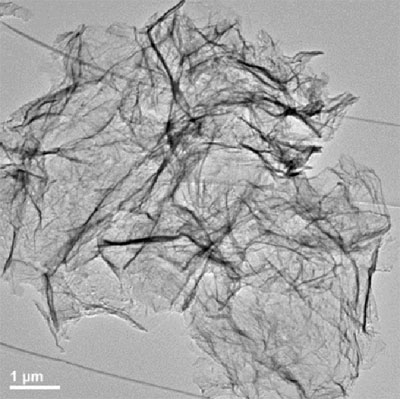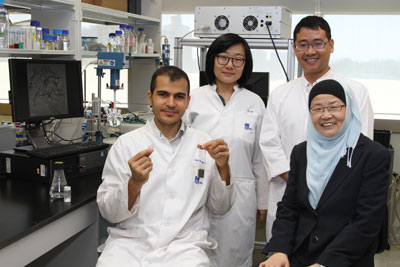A*STAR NEWS
New Technique by Singapore Researchers May Produce More Durable and Longer Lasting Lithium-Ion Batteries
Singapore- June 22- 2017 – Lithium-ion batteries are used to power many things from mobile phones- laptops- tablets to electric cars. But they have some drawbacks- including limited energy storage- low durability and long charging time. Now- researchers at the Institute of Bioengineering and Nanotechnology (IBN) of A*STAR have developed a new way of producing more durable and longer lasting lithium-ion batteries. This finding was reported today in the Advanced Materials journal.
Led by IBN Executive Director Professor Jackie Y. Ying- the researchers invented a generalized method of producing anode materials for lithium-ion batteries. The anodes are made from metal oxide nanosheets- which are ultrathin- two-dimensional materials with excellent electrochemical and mechanical properties.
These nanosheets (image on right) are 50-000 times thinner than a sheet of paper- allowing faster charging of power compared to current battery technology. The wide surface area of the nanosheets makes better contact with the electrolyte- thus increasing the storage capacity. The material is also highly durable and does not break easily- which improves the battery shelf life. Existing methods of making metal oxide nanosheets are time-consuming and difficult to scale up.
The IBN researchers came up with a simpler and faster way to synthesize metal oxide nanosheets using graphene oxide. Graphene oxide is a 2D carbon material with chemical reactivity that facilities the growth of metal oxides on its surface.Graphene oxide was used as the template to grow metal oxides into nanosheet structures via a simple mixing process- followed by heat treatment. The researchers were able to synthesize a wide variety of metal oxides as nanosheets- with control over the composition and properties.
The new technique takes one day to produce the nanosheets- compared to one week for previously reported methods. It does not require the use of a pressure chamber and has just two steps in the synthesis process- making the nanosheets easy to manufacture on a large scale.
Tests showed that the nanosheets produced using this generalized approach have excellent lithium-ion battery anode performance- with some materials lasting three times longer than graphite anodes used in current batteries.
“Our nanosheets have shown great promise for use as lithium-ion anodes. This new method could be the next step toward the development of metal oxide nanosheets for high performance lithium-ion batteries. It can also be used to advance other applications in energy storage- catalysis and sensors-” said Prof Ying.
Clockwise from bottom right: The IBN research team who developed this novel technique comprises Prof Jackie Y. Ying- Mr Ayman Amin AbdelHamid- Dr Yue Yu and Dr Jinhua Yang.
Reference:
- Ayman A. AbdelHamid- Yue Yu- Jinhua Yang and Jackie Y. Ying- “Generalized Synthesis of Metal Oxide Nanosheets and Their Application as Li-Ion Battery Anodes-” Advanced Materials- (2017) DOI: 10.1002/adma.201701427. See article
About the Institute of Bioengineering and Nanotechnology (IBN)
The Institute of Bioengineering and Nanotechnology (IBN) is the world’s first bioengineering and nanotechnology research institute. Established in 2003- IBN’s mission is to conduct multidisciplinary research across science- engineering- and medicine for breakthroughs to improve healthcare and quality of life. IBN’s research activities are focused on Nanomedicine- Synthetic Biosystems- Biodevices and Diagnostics- and Green Chemistry and Energy. The Institute has published over 1-200 papers in leading scientific journals- filed 685 active patents and patent applications on its inventions- and established 12 spin-off companies. To nurture young research talents- IBN runs a Youth Research Program that offers students research attachment opportunities and exposure to biomedical research.
For more information on IBN- please visit www.a-star.edu.sg/ibn.
About the Agency for Science- Technology and Research (A*STAR)
The Agency for Science- Technology and Research (A*STAR) is Singapore's lead public sector agency that spearheads economic oriented research to advance scientific discovery and develop innovative technology. Through open innovation- we collaborate with our partners in both the public and private sectors to benefit society.
As a Science and Technology Organization- A*STAR bridges the gap between academia and industry. Our research creates economic growth and jobs for Singapore- and enhances lives by contributing to societal benefits such as improving outcomes in healthcare- urban living- and sustainability.
We play a key role in nurturing and developing a diversity of talent and leaders in our Agency and Research Institutes- the wider research community and industry. A*STAR oversees 18 biomedical sciences and physical sciences and engineering research entities primarily located in Biopolis and Fusionopolis.
Was This Article Helpful ?
A*STAR celebrates International Women's Day

From groundbreaking discoveries to cutting-edge research, our researchers are empowering the next generation of female science, technology, engineering and mathematics (STEM) leaders.
Get inspired by our #WomeninSTEM


